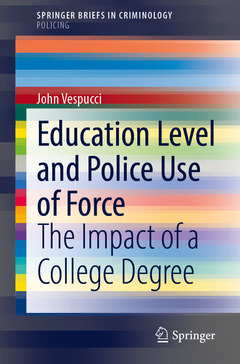Education Level and Police Use of Force, 1st ed. 2020 The Impact of a College Degree SpringerBriefs in Policing Series

This brief presents a study addressing the impact of a college degree upon officer use of force. The average American municipal police academy only requires 26 weeks of training, despite previous studies showing overwhelming support that college educated police officers apply more discretion in their use of force than officers without a college degree. Taking into account contemporary public/police conflicts and how American perceptions of police are based largely on officer use of force, this study offers a more current perspective on the profession?s changing dynamic over the past decade.
With data gathered from over 400 officers from 143 distinct municipal police agencies in 6 American states, the study examines the association between a college education and the level of force used to gain compliance during arrest situations, and notes discrepancies between previously studied factors and contextual variables. This brief will be useful for researchers of policing and for those involved with police training.John Vespucci, PhD, is an Adjunct Assistant Professor at John Jay College of Criminal Justice, Faculty Associate at Arizona State University, School of Criminal Justice and a police officer in New York State for the past 24 years.
Analyzes the association between college education and the level of force used by police during arrests
Presents a timely perspective on the policing profession and approaches to arrest situations
A useful resource for researchers of policing and those involved with police training
Date de parution : 05-2020
Ouvrage de 56 p.
15.5x23.5 cm


